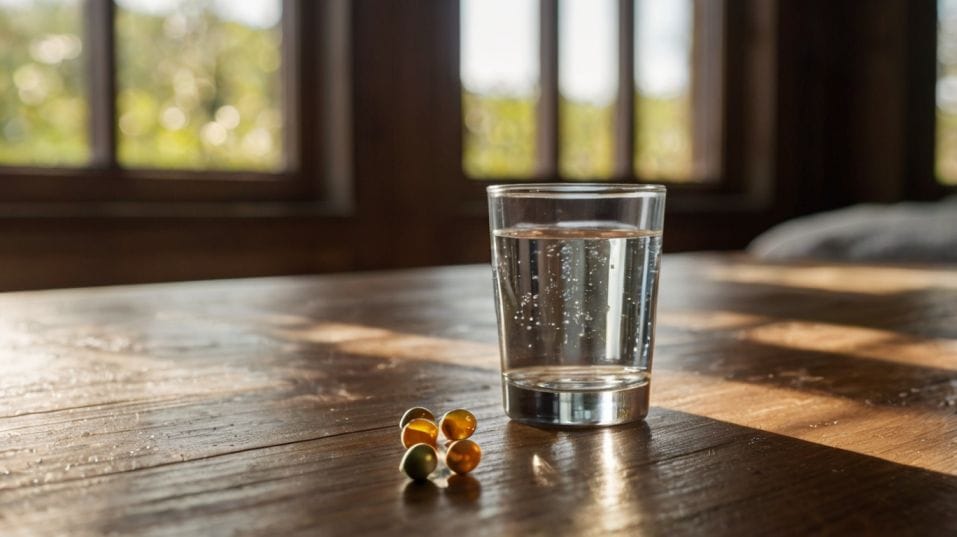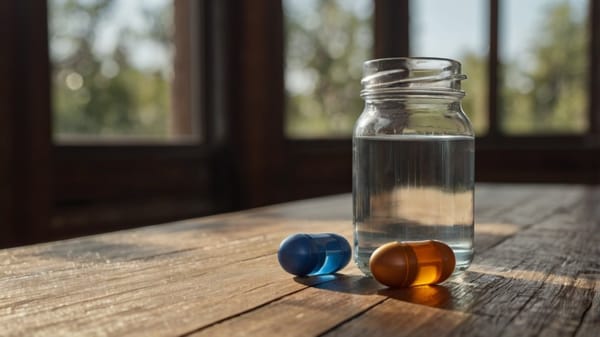Getting Sick Too Often? These Supplements Can Help
Feel like you're always getting sick? These daily supplements help your immune system stay strong, sharp, and ready—no matter the season.

Why does it feel like you're always one step away from getting sick? One cough on the train, and suddenly you're down for days. It’s not bad luck—it’s a system running on fumes.
Your immune defense isn’t broken, it’s just outmatched by the daily grind. The fix? A few simple, consistent upgrades that give your body the daily support it needs to stay sharp, responsive, and ready—before things spiral.
Your Immune System Isn’t Weak—It’s Overworked
You don’t get sick because your body’s broken. You get sick because it’s doing too much with too little. Every day, your immune system is scanning, sorting, and neutralizing threats.
When you’re sleep-deprived, eating on the go, pushing through work stress, or skipping recovery, it doesn’t have what it needs to keep up.
That’s where smart supplementation comes in—not as a panic button, but as quiet reinforcement. You’re not trying to “boost” your immunity overnight. You’re giving it consistent backup, so it stays sharp even when life isn’t.
Start with the Non-Negotiables
Some nutrients are foundational—your immune system can’t function properly without them. These are your everyday, rain-or-shine, no-matter-what staples.
Vitamin D: Light in a Bottle
If you don’t get daily sunlight on your bare skin, you’re probably low on vitamin D. And that matters—because this vitamin plays a central role in how your immune system identifies and responds to pathogens.
It also helps regulate inflammation, which can keep minor issues from turning into long-lasting illnesses.
Best time to take it: With your first meal of the day, preferably one that includes healthy fats to aid absorption.

Zinc: Your Cellular Repair Crew
Zinc doesn’t just help shorten the duration of colds—it’s essential for immune cell development and communication.
It also helps maintain the integrity of your skin and mucous membranes, which are your body’s first physical barrier against invaders.
Use it consistently: A small daily dose supports immune readiness. It's most effective when taken preventatively—not just during illness.
Add Herbal Support to Handle High-Stress Seasons
When you’re sleep-deprived, traveling, or dealing with emotional stress, your immune system takes a hit. Certain herbs help keep your internal defenses alert without pushing them into overdrive.
Elderberry: Fast Response, Less Downtime
Elderberry has long been used during cold and flu season. It contains antioxidants and plant compounds that help your body respond faster to viral exposure. Think of it as helping your immune system “see” the threat quicker.
When to take it: At the first sign of feeling off, or during high-risk weeks (like travel or seasonal transitions).
Echinacea: Seasonal Resilience
This is your go-to herb for general immune fortification. It’s not something you need year-round, but cycling echinacea during winter months or stressful periods can give your system extra adaptability.
Stack smart: Pair it with elderberry or vitamin C for better effect. Use for a few weeks at a time, then pause.
Don’t Forget the Gut—It’s Your Immune Headquarters
Roughly 70% of your immune system lives in your gut. If your digestion is out of sync, or your microbiome is out of balance, your immune response is too.
Probiotics: Build Your Inner Defense Team
A diverse and balanced gut microbiome helps regulate inflammation, process nutrients, and maintain immune integrity.
Probiotics help replenish beneficial bacteria—especially if you’ve been on antibiotics, eating poorly, or under chronic stress.
How to take it: Choose a multi-strain probiotic and take it with your first meal. Look for strains like Lactobacillus and Bifidobacterium.
Prebiotics: Fuel the Good Guys
Prebiotics aren’t supplements themselves—they’re fibers that feed healthy gut bacteria.
Some probiotics include them, but you can also get them from foods like garlic, leeks, onions, and bananas. If your diet lacks variety, a standalone prebiotic supplement might be worth adding.
Upgrade the Basics for Better Absorption and Impact
It’s not just what you take—it’s how your body uses it. Certain forms of supplements are absorbed more efficiently and offer longer-lasting effects.
Liposomal Vitamin C: The Absorbable Antioxidant
Unlike traditional vitamin C tablets that pass through quickly, liposomal vitamin C is encased in a fat-based layer that helps your body absorb and retain it longer.
This means better cellular protection, less inflammation, and more consistent immune support. Pro tip: A small daily dose is better than occasional megadoses.
Mushroom Extracts: Adaptable, Functional Support
Medicinal mushrooms like reishi, chaga, and turkey tail don’t just help immunity—they support your body’s stress response and cellular resilience. They work in the background, helping you stay balanced under pressure.
How to use them: Powders are easy to blend into coffee or smoothies. Capsules work too. Take them daily for cumulative benefits. Let’s bridge this next section to focus on recovery.
Sleep and Recovery Make or Break Your Immunity
You can take the perfect supplement stack—but if your body never fully rests, your immune system never gets to do its deeper work.
Magnesium + Glycine: Restore While You Sleep
Magnesium helps calm the nervous system and reduce stress. Glycine is an amino acid that promotes deeper, more restorative sleep.
Taken together in the evening, they set your body up to repair and recover overnight—so you wake up sharper and more resilient. Routine tip: Take about 60 minutes before bed, ideally after your last screen time.
L-Theanine or Ashwagandha (Optional Wind-Down Boosts)
If your mind races at night, these additions can help you downshift without grogginess.
L-Theanine supports calm focus, while ashwagandha helps reduce cortisol and mental tension. These aren’t must-haves—but if stress is affecting your sleep, they’re worth exploring.
What a Daily Immune Routine Actually Looks Like
You don’t need a shelf full of bottles. You just need a rhythm. Here’s an example of how a simple immune-supporting day might look:
Morning:
- Vitamin D3 (with breakfast)
- Probiotics
- Zinc
Midday:
- Liposomal Vitamin C
- Mushroom blend (capsule or powder)
- Elderberry (during high-risk periods)
Evening:
- Magnesium + Glycine (1 hour before bed)
- Optional: Ashwagandha or L-Theanine if stress is high
This stack isn’t designed to fix you when you’re sick. It’s designed to help you stay well—so you don’t need to play catch-up every other week.
Final Thoughts
Your immune system is built to protect you—but it needs consistent input to do that job well. When you nourish it daily, you don’t just dodge sickness—you gain energy, clarity, and confidence to move through life without constant setbacks.
You don’t need to obsess over protocols or trends. Start with the basics. Stick to them. Let your body catch up to the life you want to live.
Start now. Support your system today so you can keep showing up tomorrow—strong, steady, and ready.




